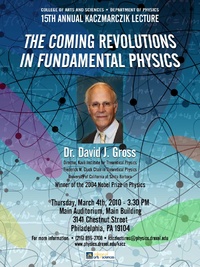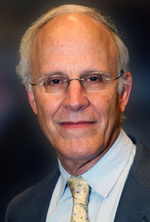15th Kaczmarczik Lecture
"The Coming Revolutions in Fundamental Physics"
David J. Gross, PhD
Director, Kavli Institute for Theoretical Physics
Frederick W. Gluck Chair in Theoretical Physics
University of California at Santa Barbara
Winner of the 2004 Nobel Prize in Physics
Monday, April 15, 2010
3:00 p.m.
Main Building Auditorium
3141 Chestnut Street
Philadelphia, PA 19104
 I review the present state of knowledge in elementary particle physics and the questions that we are currently addressing. I discuss the experimental revolutions that might occur at the Large Hadron Collider. I shall also review the state of string theory. The necessity to go beyond the standard model of particle physics and to understand quantum gravity has led to this ambitious attempt to unify all the forces of nature and all forms of matter as different vibrations of a string-like object. But string theory is still in a pre-revolutionary stage. Although remarkable progress has been achieved in the last decade we still lack a fundamental understanding of the theory. Many string theorists suspect that a profound conceptual change in our concept of space and time will be required for the final formulation of string theory.
I review the present state of knowledge in elementary particle physics and the questions that we are currently addressing. I discuss the experimental revolutions that might occur at the Large Hadron Collider. I shall also review the state of string theory. The necessity to go beyond the standard model of particle physics and to understand quantum gravity has led to this ambitious attempt to unify all the forces of nature and all forms of matter as different vibrations of a string-like object. But string theory is still in a pre-revolutionary stage. Although remarkable progress has been achieved in the last decade we still lack a fundamental understanding of the theory. Many string theorists suspect that a profound conceptual change in our concept of space and time will be required for the final formulation of string theory.
 David Gross is the Frederick W. Gluck Professor of Theoretical Physics and Director of the Kavli Institute for Theoretical Physics at UCSB. He received his PhD in 1966 at UC Berkeley. He was previously Thomas Jones Professor of Mathematical Physics at Princeton University. He has been a central figure in particle physics and string theory; including the discovery of asymptotic freedom and the consequent development of Quantum Chromodynamics, the theory of the strong nuclear force. This completed the Standard Model, which details how the three basic forces of particle physics--the electromagnetic force, the weak force, and the strong force--interact. He has also made seminal contributions to the theory of Superstrings, a burgeoning enterprise that brings gravity into the quantum framework, especially the discovery and development of heterotic string theory. His awards include the Sakurai Prize, MacArthur Prize, Dirac Medal, Oscar Klein Medal, Harvey Prize, the EPS Particle Physics Prize, the Grande Medaille d'Or and the Nobel Prize in Physics. He holds honorary degrees from the US, Britain, France, Israel and Brazil. His membership includes the US National Academy of Science, the American Academy of Arts and Sciences, the American Philosophical Society, and the Indian Academy of Science.
David Gross is the Frederick W. Gluck Professor of Theoretical Physics and Director of the Kavli Institute for Theoretical Physics at UCSB. He received his PhD in 1966 at UC Berkeley. He was previously Thomas Jones Professor of Mathematical Physics at Princeton University. He has been a central figure in particle physics and string theory; including the discovery of asymptotic freedom and the consequent development of Quantum Chromodynamics, the theory of the strong nuclear force. This completed the Standard Model, which details how the three basic forces of particle physics--the electromagnetic force, the weak force, and the strong force--interact. He has also made seminal contributions to the theory of Superstrings, a burgeoning enterprise that brings gravity into the quantum framework, especially the discovery and development of heterotic string theory. His awards include the Sakurai Prize, MacArthur Prize, Dirac Medal, Oscar Klein Medal, Harvey Prize, the EPS Particle Physics Prize, the Grande Medaille d'Or and the Nobel Prize in Physics. He holds honorary degrees from the US, Britain, France, Israel and Brazil. His membership includes the US National Academy of Science, the American Academy of Arts and Sciences, the American Philosophical Society, and the Indian Academy of Science.
High School Open House Program:
12:30 - 1:00 p.m. Main Building Auditorium
>1:00 - 3:00 p.m. Department of Physics Open House
Brief presentations on Biophysics, Astrophysics, Computational Physics, Condensed Matter, Nonlinear Dynamics, Particle Physics, etc. An excellent opportunity for high school students to visit our laboratories and meet in person with our internationally recognized researchers.
3:00 - 3:30 p.m. Reception
About the Kaczmarczik Lecture
Paul Kaczmarczik began his career as a Professor of Physics at Drexel University in 1953. A key player in building the Physics and Atmospheric Science Department, he made important contributions to teaching at Drexel University during his many years of service. Well-liked by both his colleagues and his students, Professor Kaczmarczik became Professor Emeritus in 1989. The Kaczmarczik Lecture Series was established in 1995 in honor of Professor Kaczmarczik. It brings to Drexel outstanding scientists to present lectures on topics at the cutting edge of Physics research.